Can anyone hear about the pain I suffered?
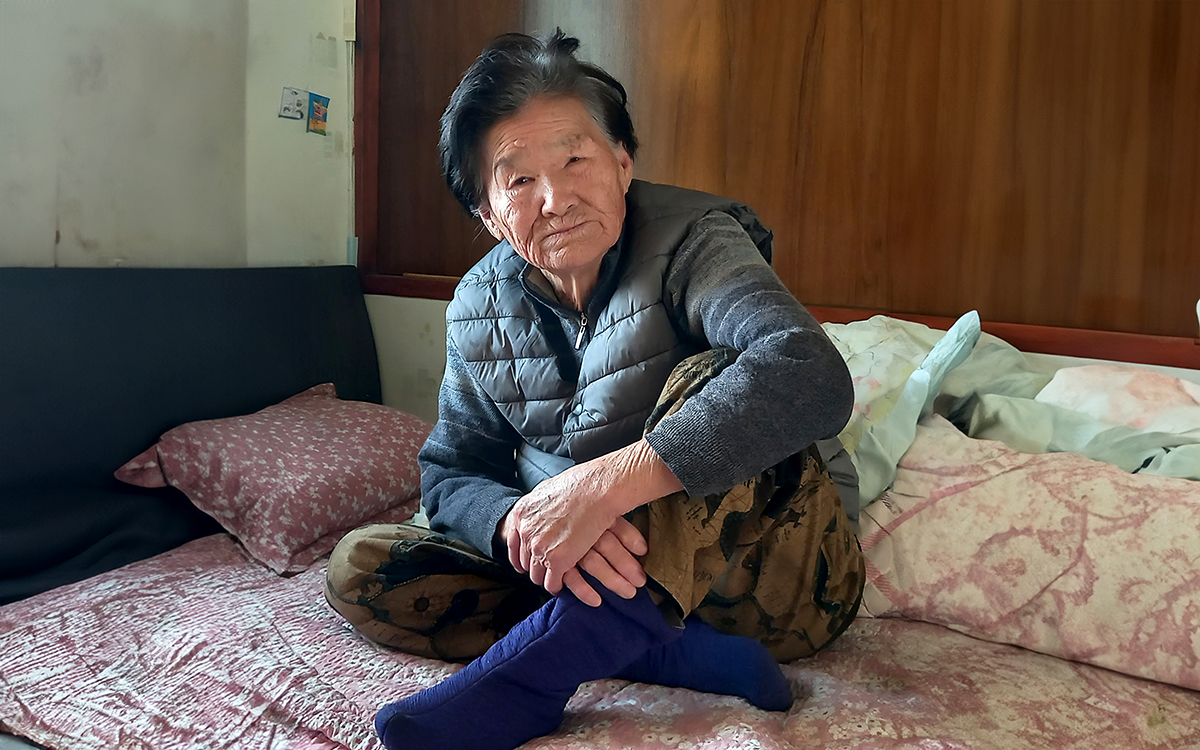
Jeju 4·3 Testimony Yang In-ja, a surviving victim (born 1938 in Jeoji-ri, Hangyeong-myeon, now lives in Gwideok-ri, Hallim-eup)
Yang In-ja has five visible wounds from being stabbed on her arms, legs, and belly. Yet, she is not registered as a patient with Jeju 4·3 residual diseases. She has never registered herself as a surviving victim of Jeju 4·3. “Is it okay for a living one like me to report myself?” We, the interviewers, were embarrassed when she asked. She has taken sedatives because she still suffers from the unforgettable memory of the day she was stabbed with a spear. As we told her that it was okay to tell the world the rest of her story, the elderly victim asked us again. “Can anyone hear about the pain I suffered? The false charge, my tears, and all the pain?” Now she tells her story of Jeju 4·3 after 75 years have passed.
Interviewed and photographed by Cho Jeong-hee, Leader of General Affairs Team, Jeju 4·3 Peace Foundation
My mother was 40 when she gave birth to her last child, me
I am 85, but I am recorded as five years younger in my family register. My resident registration card also says I am 80 now. I was 10 when Jeju 4·3 occurred. I was born near the coast of Dangnu.
It is now called Namdong of Jeoji-ri. To me, a little kid, it looked like a large neighborhood although I don’t remember how many families there were. It had a police substation, and probably because of that, I sometimes heard gunfire, which scared me.
At the time of Jeju 4·3, I lived with my parents, the second oldest brother and the youngest older brother. My parents had seven children, and I was the youngest child. I had three older sisters and three older brothers. All my sisters and the oldest brother were married and living with their families. My mother was 40 when she gave birth to me. When Jeju 4·3 occurred, my mother was 50, and my father was 52. They were pretty old at the time.
I was afraid of both sides at the time
When Jeju 4·3 occurred, we were so terrified that we couldn’t stay in our home. There were rumors that soldiers shot someone dead randomly on his way to collect jeji [cabbage seed]. All the villagers were scared because anyone wandering around could have ended up dead. My goodness! I even heard that a startled mother who had run away found out she had taken a pillow instead of her baby. Because of the madness of killing, people could not remain sober. No farming, no ordinary lives, but only running. They ran to the mountains, the fields, and the sea. Families couldn’t move together because no one was sure about which group would survive. If they were caught all at the same time, the whole family would be exterminated. When people were caught providing something to those hiding in the mountains, soldiers would come and kill the ones who helped.
When they were seen collaborating with the soldiers, the ones from the hills would kill them, too. I was afraid of both the mountain people and the soldiers. If we had been forced to take only one side, we could have just listened to them and lived. We could not choose which one to side with because both sides were watching us, trying to kill us any time.
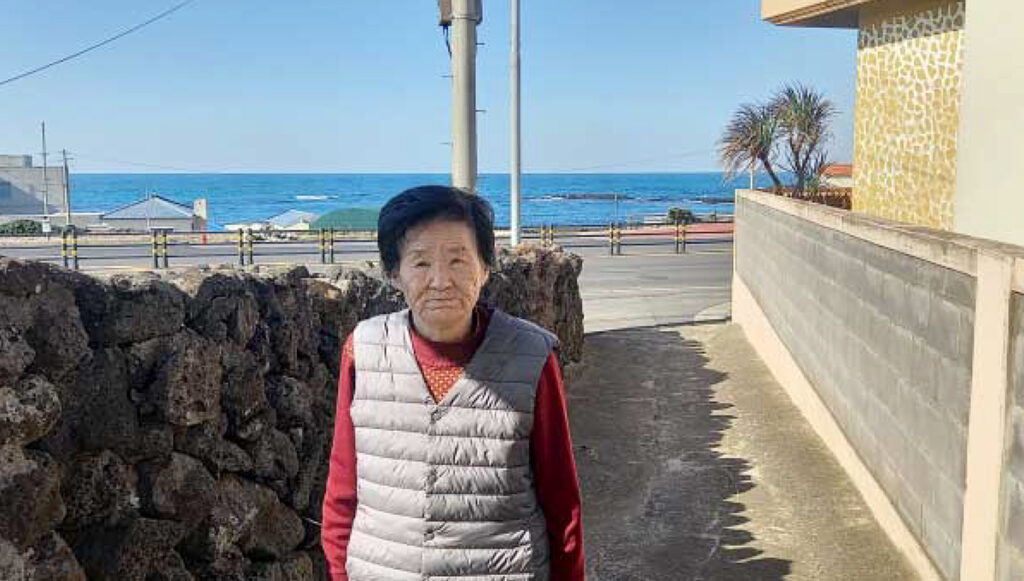
Yang In-ja, who fed her family throughout her life by diving in the water, is in front of the blue sea.
Give me that food!
My second and youngest older brothers went hiding in the mountains. My parents and I hid in the bamboo field behind our home. We were hiding for days and nights.
We were terrified because rumors were that soldiers would come and kill anyone who turned the lights on.
I do not know the exact date, but it was around fall when the weather was not too hot or cold. We were raided as we were beating the bean harvest. My parents and I were still hiding in the bamboo field. My mother, who hadn’t eaten all day, told me to go home, cook, and return with the food. The food we could get could have been of better quality. It was usually a handful of barley, either fried or boiled. Since there was no way that I could turn on the lights, I had to enter my home at daybreak. I found some 20kg of barley in gudeok, a coated bamboo basket. When I was just about to boil it, the kitchen door suddenly opened! Three men, probably in their twenties, stood holding a long bamboo spear in front of me.
“Give me that food!”
“We are starving. Why are you going to take our only food!”
I was too young. I only cared about the food for my parents and held it tight.
Take all the food you want! All of it!
There was a brief but dreadful silence. I cannot forget their silent, fierce glares. My legs were so trembling that I was about collapse in a minute. My heart was pounding wildly as if it were going to blow up. Then I lost my strength with the flash of the blade fastened onto the bamboo spear that stabbed me. I grasped my belly and fell flat on the kitchen floor. The moment I felt something warm in my hands, I screamed, “Ah!” It was so painful. Blood was spilling over my belly.
“Oh, I am sorry. Take all the food you want! All of it!”
How could I be in my right mind? I sat on the floor in pain and covered my face with my hands. I could not look up and face them. The men relentlessly speared me, a 10-year-old girl. That’s when I thought, ‘So this is how I die!’ They were determined to kill me. Otherwise, they did not need to stab me after taking the barley. Then I heard a whistle blow, and the men left hurriedly. It must have been a sign to rally them. Had the whistle been blown a little later, I would not be sitting here.
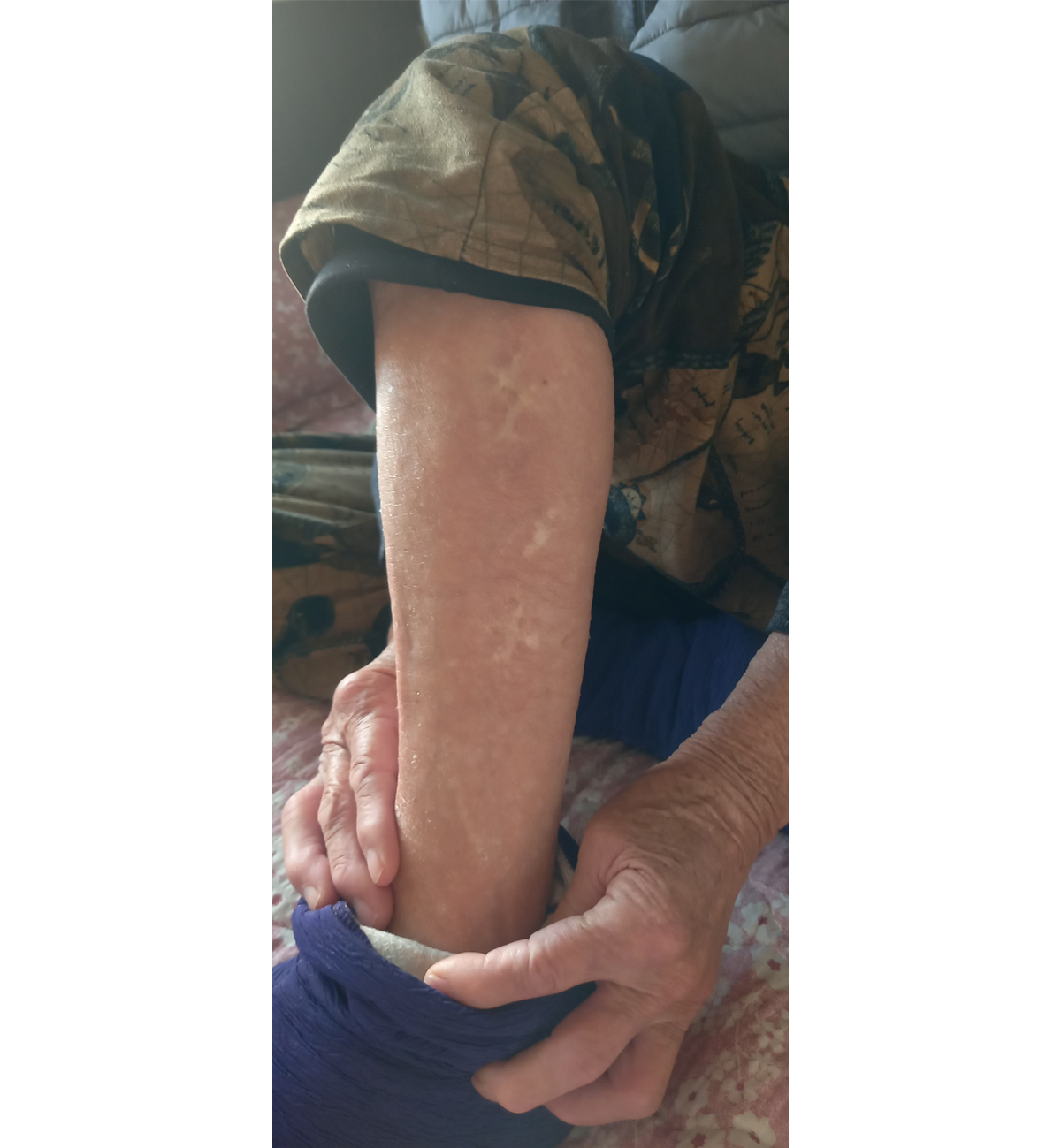
The scars on her left leg. There are three spots showing the stabbed wounds.
Don’t cry, dear, or you will get us all killed!
I was stabbed five times. There are three stab marks on my left leg, one on my left arm, and the other on my belly. I was lucky that my intestines were not torn and my bones were not broken. I nearly used my arms to crawl to the bamboo field, pushing myself forward with my right leg, which had not been stabbed. When my mother saw me covered in blood, she put her hands on my mouth.
“Don’t cry, dear, or you will get us all killed!”
Only 10 years old, I was scared to death, stabbed by spears when alone. Imagine how painful it would be. I felt sorrow about my mother who covered my mouth as soon as she saw me bleeding even if it meant that I could get us all killed. My father told me not to cry out, saying I might get us all caught. How embittered I was. I wasn’t allowed to express my pain nor cry. I just stayed silent, as my parents told me to. There was no such thing as medicine. All my parents could do was gather mugwort and place it on my wounds. They were also desperate for their own lives!
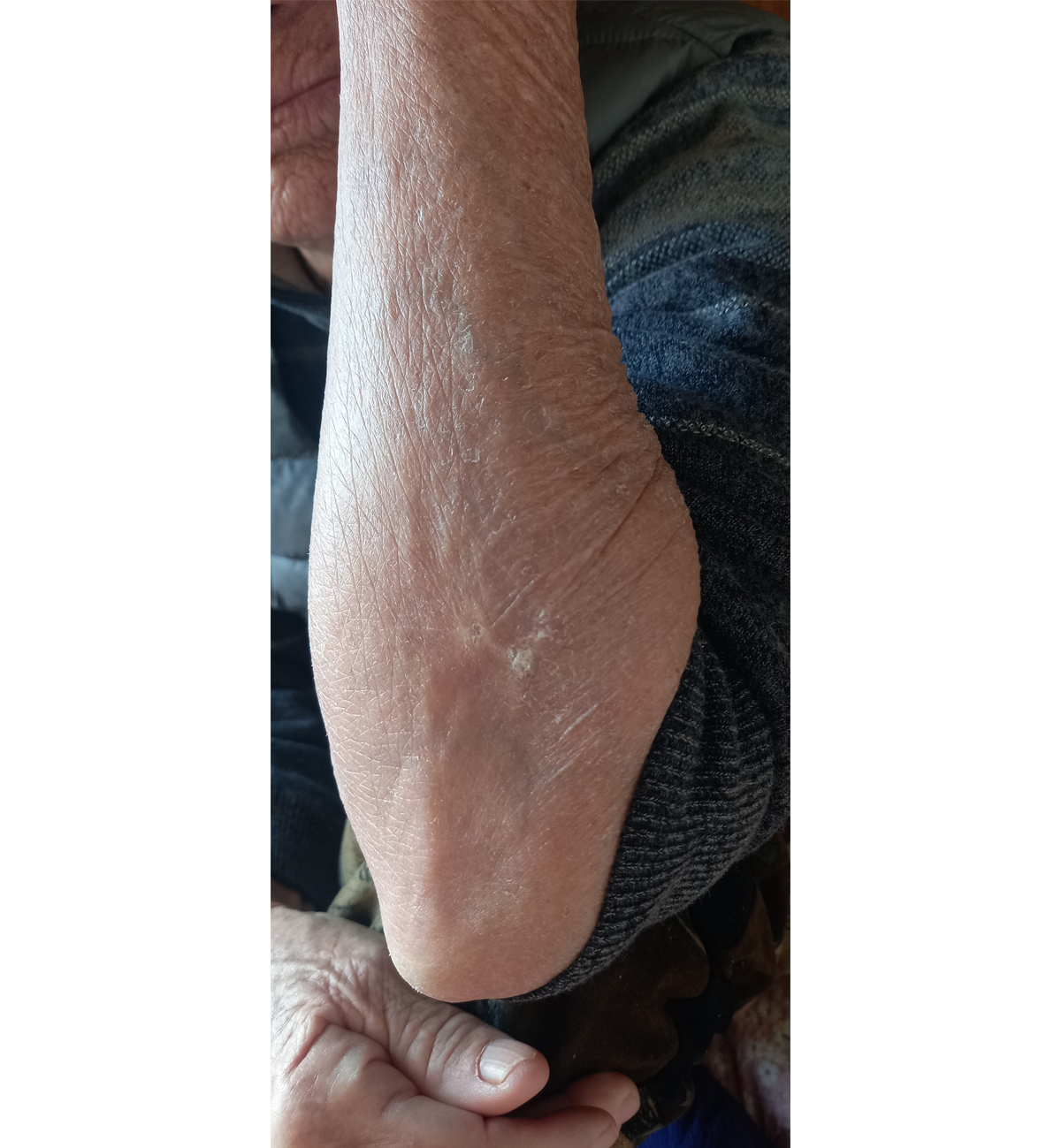
The scar on her left arm, a stabbing wound.
You will be well off with your intestines intact
The raid on that day was not for killing but for scavenging food only. If I had given them the barley, I wouldn’t have suffered this badly. I was too young to know what was at stake. One day, my cousin, who was older than me, was speared just like me when he was standing guard at the police substation. I don’t know how the assailants stabbed him, but my cousin was barely breathing, with his intestines spilling out of his belly.
It seemed he was still alive because his intestines were not torn. But now he needed his intestines back in his stomach to stay alive longer. When the organs were put back into the belly, they would soon slip out again. My adult family members tried put them back in, again and again, but to no avail. They had to do something to keep him alive.
They put him on a stretcher and visited an acupuncturist in the western village of Gosan. When the acupuncturist slightly lifted the flesh of my cousin’s belly, the intestines came back into his stomach. My family elders did not know what to do but kept grabbing the intestines, trying to put them back, but failing repeatedly. The acupuncturist stitched my cousin’s belly after that. Fortunately, there was no infection and the wound healed. My cousin later served in the military and got married. He never got to testify that he had the experience of being stabbed by spears before he died.
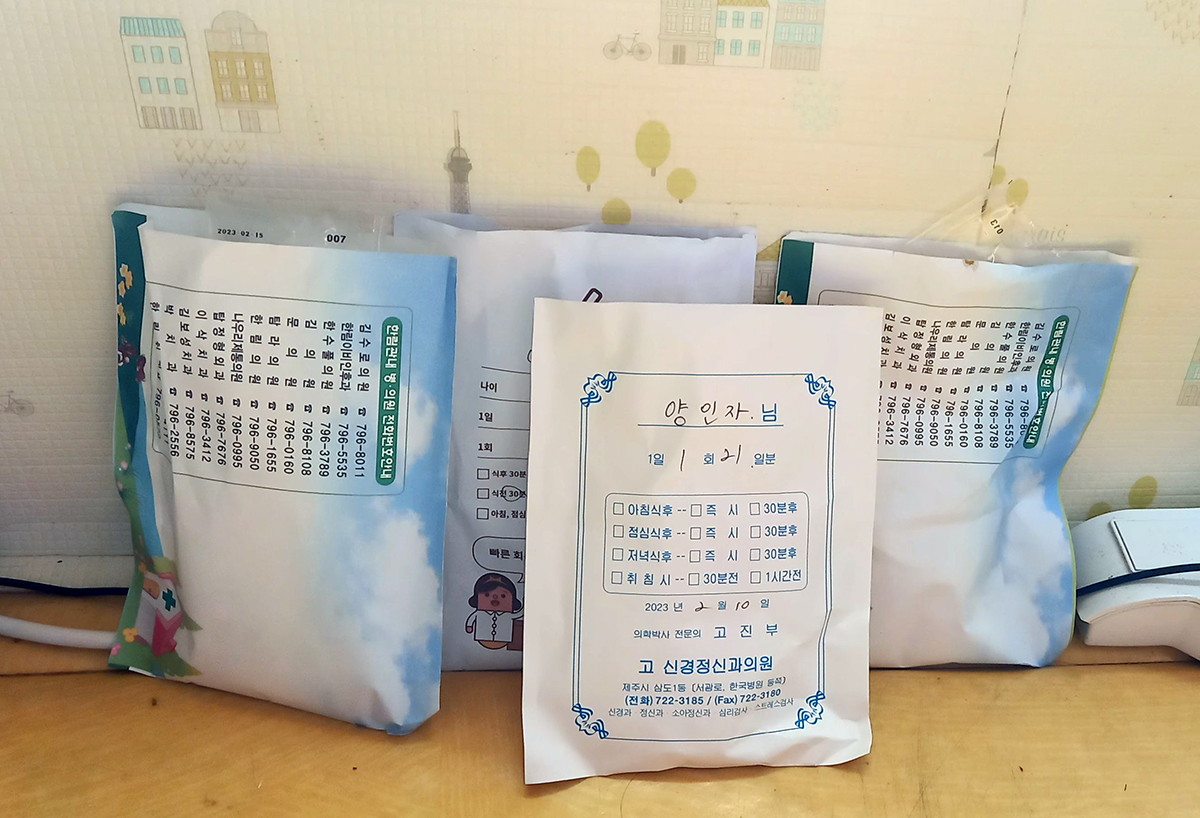
Sedatives Yang has been taking her whole life due to the traumatic memory.
Saving lives with a cow
I lived in the bamboo field for about three months from the event. An evacuation order was delivered to force us to evacuate our home in Dangnu and move to Gosan. My brothers who had hidden in the mountains came along during this evacuation. The residents of Dangnu (District 1 of Jeoji), Mengi-dong (Myeongi-dong or District 2 of Jeoji), Cheongsu, Josu, and Nakcheon all stayed in the yard of Gosan Elementary School for three days.
On the second day, soldiers came holding a document and started calling names. My brothers were lucky not to be called upon, unlike many young people from Mengi-dong, who I heard were all shot dead afterwards. It was a time when anyone might say, “That’s a rioter,” and they would be summarily executed. My father, who feared that young Gosan residents might report my brothers as mountain-based rioters, slaughtered the cow that had been carrying our belongings and fed the young Gosan residents. He served the beef to save the lives of my brothers. I think it worked because my brothers stayed safe during Jeju 4·3.
In the schoolyard we were cooking the barley grains we took during the evacuation when the soldiers told us to rent a room and leave the place. We had no friends, not even relatives in Gosan to allow us to rent a room. What could we do? We had no idea of what to do. Then, a Gosan villager came and suggested we stay in their hut—that is, if it was okay for us. We cleaned the hut and made a floor of haulm. We spent five to six months in it. Then, we were told to move to Josu-ri. I guess the situation got a bit loose.
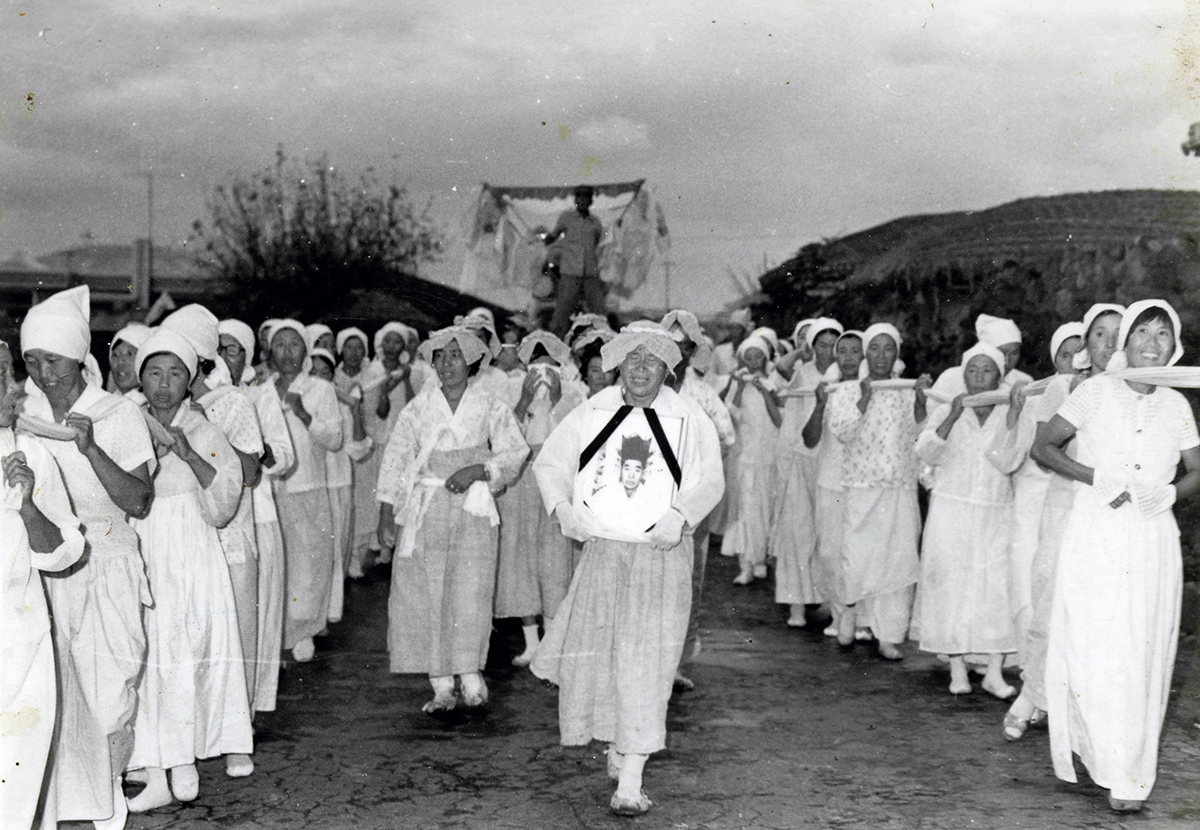
Yang, 38 years old, holding her late father-in-law’s portrait at his funeral (1975) in Gwideok.
A ladle of corn porridge for a meal
We went to Motgol in Josu-ri and spent a year in one of many makeshift houses, with the floor covered with barley stalks. When things got a little more loose, all of the relocated were told to return home.
When we returned to our home in Dangnu, all of the houses were burnt down. There was no food or clothes left. After the evacuation order, soldiers had burnt down the entire village. We needed a room for us to sleep in. We carried rocks and formed a circle for a wall. We plastered mud onto the wall and cut wood to make the roof frame. Then, we thatched the roof to make a small room. We made the floor out of barley stalks, but we could not stand the cold weather. We used to be scared if we would starve to death, and now we were about to freeze to death. Reluctantly, we moved to Suwon-ri.
At the time, the village of Suwon-ri was safe from the evacuation order. There were houses left. We knew a distant relative who could rent us a room and a kitchen. We settled there and never returned to Dangnu.
When settled there, my father would make straw mats and mesh bags and exchange them for rice. That was the only food we had for a while.
After several months, those at the Catholic Church of Hallim distributed flour. I mean Americans there. We used to make sujebi [soup boiled with flour dough] and porridge out of it. Later, the flour ran out, and they started giving out corn flour. And then we were given corn porridge. A large cauldron was placed in the churchyard for cooking the porridge. People would get the porridge individually—one ladle per person. There were not many dishes around because most of them had been burnt during the evacuation order. People would carry a small jug and tell the distributor how many were in their family. Then they poured the porridge into the pot—one ladle per person. We added water to the porridge, making it thinner but larger in volume. We had to make the amount of two to three meals out of it. This is how we survived.
It is like telling me to die suffering!
It took about three years for my wounds to heal. I was given no medicine, only mugwort patches. My wound did not granulate. Instead, the gash was left open and began to rot. Sores oozed and pus was all over the wound. It was like piercing the spots with needles. The burning feeling tormented me, too.
“This isn’t for me to endure! It is like telling me to die suffering!” I thought to myself.
Honestly, no one seemed to be hoping that I would live, not even my parents. In fact, everyone was worrying about their own lives and deaths. But as time passed, the wounds slowly healed after three years. Still, the scars would throb whenever the weather was rainy or windy. The aching had me crying, but that died as time passed.
My scars were once distinctly visible, but now they are faded. It’s weird, though. I could never forget the moment of being stabbed, even as the wounds faded away.
A 12-year-old diver girl became the breadwinner of the family
As I grew older, I became a diver to get food. Children born near the coast naturally learn how to swim.
Playfully swimming at sea, you get to gather sea mustard. This is how you begin diving. Even though a 12-year-old girl could only harvest a handful of sea mustard, the price was not bad then. I used to collect and dry three or four bundles of sea mustard a day. When I had collected ten bundles, I sold them at the Hallim Market.
When I grew up, I worked in Ulsan as a haenyeo for five years. Back then, harvesting turban shells and abalone was not profitable. But working in mainland Korea was more lucrative than working in Jeju because the sea on the mainland had more products like agar-agar and seagrass that were exported to Japan. At the time, I had to earn and feed my parents. They were both over 50 and could only do a little work. We had five cows before the evacuation order, but they were long gone. Diving was the only thing I could do to make a living for my family.
I got married at 24. My husband was from Gwideok. He was six years older than me. We farmed together and bought a house and a field. We had three daughters and a son. I continued diving after marriage until my body suddenly paralyzed underwater when I was 45. We did not have the rubber suits as we do now. I used to wear mulsojungi [underwear used as a diving suit] which did not protect me from the cold water. So, I had to come out of water to warm myself in the heat of bulteok [a stone-walled rest area for haenyeo] after diving in the sea before I went back in again. But my family was so poor that I tried to earn more. And the greed made me ill. The freezing water often turned my arms and legs with stabbed wounds ache and throb. But I spent too much time in the water, and my body could not endure the low temperature. Then the paralysis came. I was saved in time by my fellow divers in the water. Had it not been for them, I would’ve died in the water. I could never dive since then.
My whole life, I have been a relentless earner. Never have I thought of my likes and dislikes. I just lived on and on to find myself here and now. I never enjoyed myself as a young woman. I woke up and dived. When unable to dive, I worked in the field. This is how I have lived.
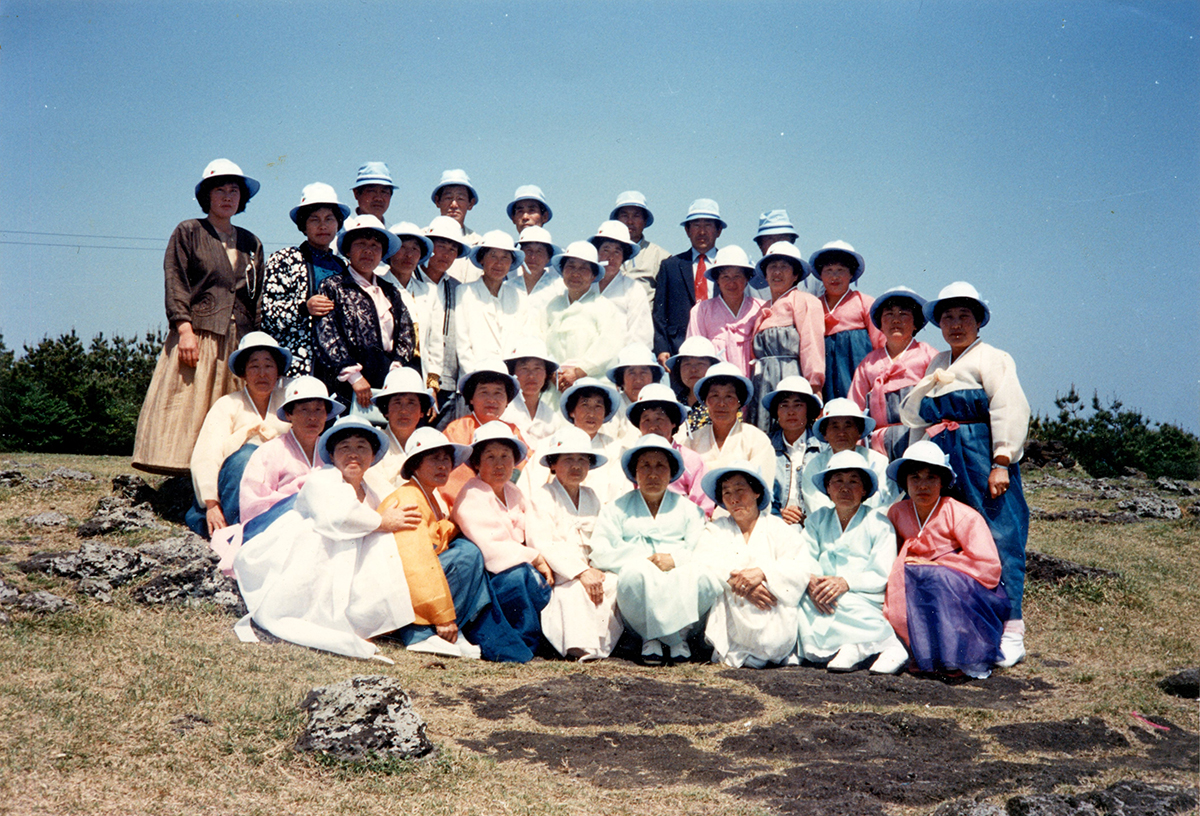
Traveling around Jeju with members of the Gwideok Women’s Society. This is the only picture of her excursion left in her photo album. Yang stands fifth from the left in her pink hanbok.
Can anyone hear about the pain I suffered?
I did not want to say anything about Jeju 4·3 because it was too painful and fearful to talk about it. My heart still pounds hard whenever the memory of being stabbed comes alive. I have to take sedatives to calm down and go to bed. I kept the story to myself, and it made me ill. I haven’t even told my children my life story. Sometimes when I watched a victim of Jeju 4·3 on TV, I thought, “That person has suffered like me! That person too has lived, unable to cry out, with no one listening!” I was relieved as if I shared my pain with that person.
The world has changed, and people say I can now talk about what I experienced during Jeju 4·3. But with what words, for how long, could I possibly describe my pain?
Can anyone hear about the pain I suffered, sincerely listening to how resentful it was, how it still makes me cry?
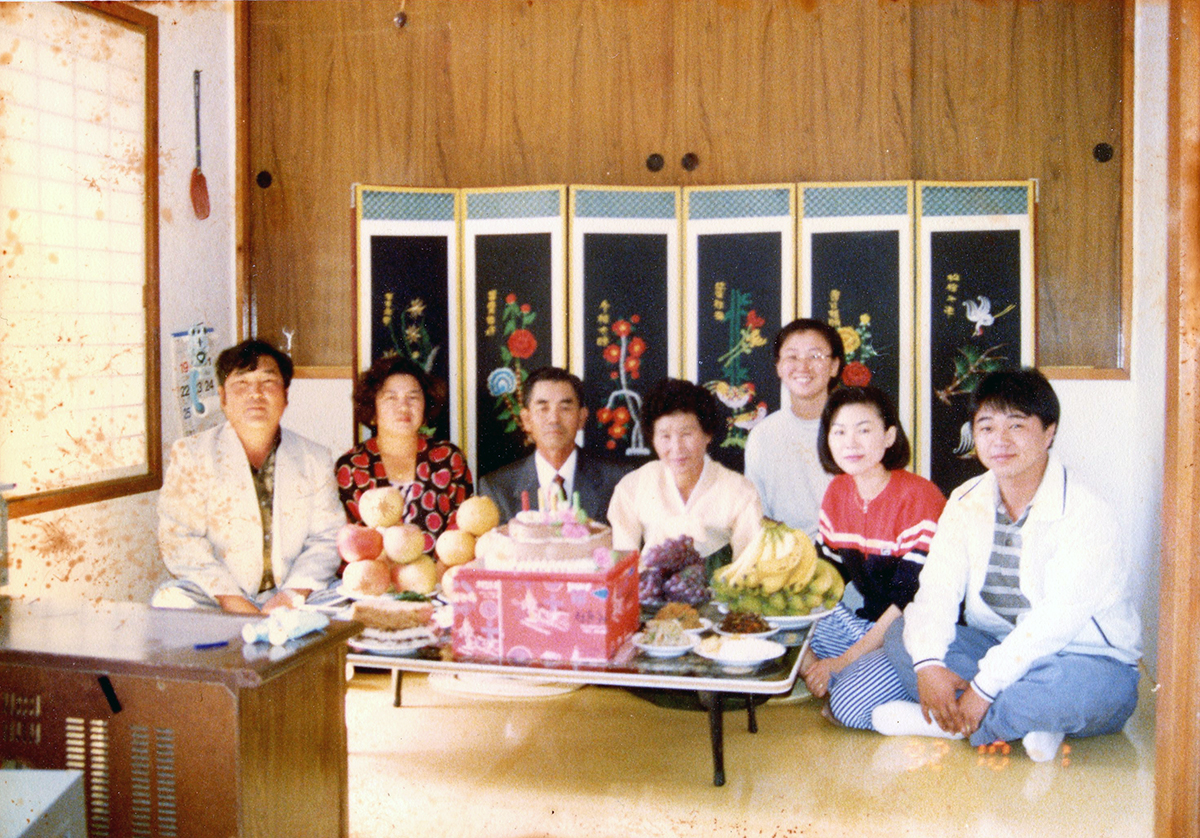
Photo of Yang’s family, taken on her husband’s 60th birthday celebration (1992).